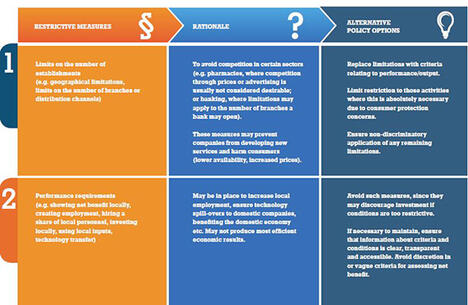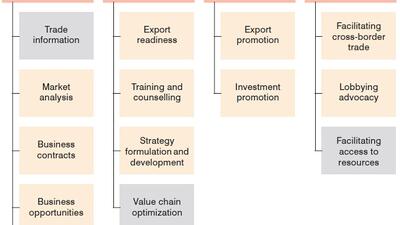Ensuring business-friendly services regulation through dialogue
The linkage between regulatory reform and liberalization in services trade has been receiving increased attention from international institutions including the World Bank, the Organisation for Economic Co-operation and Development and the World Trade Organization. Building on their work, the International Trade Centre (ITC) is launching an assessment framework to promote business-friendly services regulations. Understanding trade restrictions is particularly pertinent in a global economy where supply chains are fragmented. Reducing burdensome services trade restrictions is thus an important part of the reform process.
This Public Private Dialogue (PPD) approach to regulatory assessment aims to assist governments of developing countries in selecting the most appropriate, least trade-distorting policy options. Services are typically regulated by domestic measures. Regulatory assessment and analysis takes into account the aims of the underlying policies for particular services sectors.
The national governance framework for the sector in question is also considered to determine feasible policy options and institutional reform capacities. Services sector competitiveness depends on factors such as domestic institutions, local infrastructure and access to key services. Those may include telecommunications, transport, distribution, and financial services.
Major stakeholders are engaged by ITC directly through PPD to identify restrictions affecting trade in services and choose appropriate regulatory options. Their commitment is essential to building awareness of potential long-term benefits and short-term costs of improved guidelines. With the participation of key players, including the business community, PPD seeks to minimize the risks associated with market failure while providing a forum to map and address restrictive regulation.
The table on the next page can help to frame discussion on policy options. When deciding on appropriate action, the particular governance framework and scope of reform in the country in question should be taken into account.
The government establishes regulations to achieve multiple objectives. In some cases services trade restrictions are established to protect domestic industry and merit review. In others the restrictions may serve an economically inefficient social objective the government wants to preserve. The PPD process seeks to reach the most appropriate balance to ensure that objective is achieved with minimal market distortion.
The reassessment of regulatory requirements in the South African road transport sector offers an example of a successful PPD process. The government, concerned about a regulatory loophole that allowed too many foreign truck drivers to enter South Africa for domestic work, announced in 2010 it would require foreign drivers to have a work permit. The stated aim was to promote employment of local drivers.
However, the trucking industry objected, arguing the employment impact was insufficient to justify the extra costs of the measure. The South African government accepted the industry’s point of view and changed the regulatory requirement to a time limit on the entry of foreign drivers.














